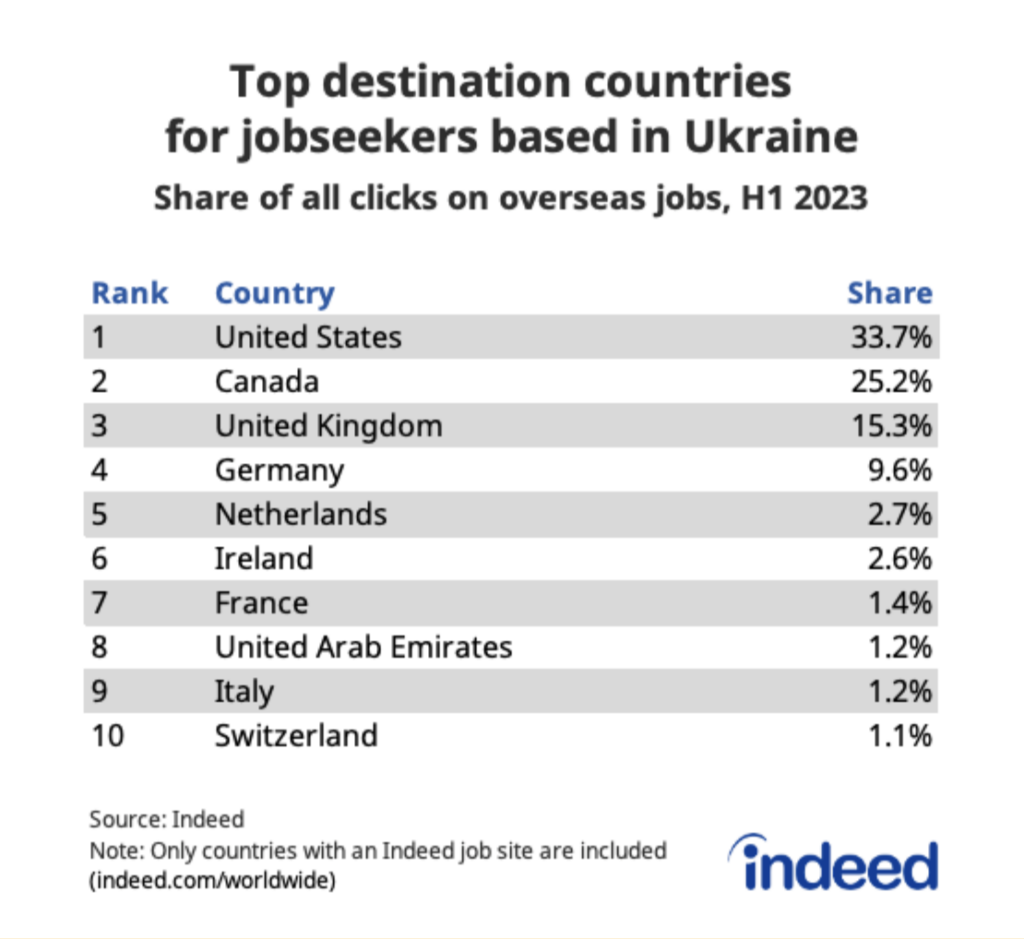Key Points:
- Searches from foreign workers for roles in many Western countries have risen from pre-pandemic and pandemic-era norms. In the UK, Canada and Australia, searches from potential workers located abroad have surpassed their June 2019 levels by 69%, 74% and 141%, respectively.
- However, searches from abroad for jobs in the European Union are just 5% above their June 2019 levels and remain well below the level in the United Kingdom, which eased its requirements for non-EU workers after Brexit.
- Software development, hospitality, and personal services are among the most sought-after job categories in the EU for foreign candidates.
- The nationality of foreign jobseekers largely depends on the country where the job is located—local language, the presence of cultural diasporas and/or geographical proximity play an important role.
Just 2.8% of clicks on EU job postings in June came from workers located outside the EU, up from pandemic-era lows but far below the foreign click share on jobs in other developed, English-speaking markets including the UK, Canada, Australia and the US.
Immigration to developed countries has rebounded significantly in recent years, fueled in large part by tight labour markets and long-term demographic trends including ageing populations and shrinking local workforces. But more than a year after the launch of the EU Skills and Talent Package, meant to attract skilled workers to the European Union, Europe is struggling to establish itself as a top destination for jobseekers looking at opportunities abroad—including Ukrainians.
This analysis of jobseeker click data on Indeed also identified which jobs are most popular for foreign searchers looking at jobs in other countries, and from which nations those searches were coming. Tech and healthcare roles—including software development and nursing—were among the most popular jobs sought by foreign jobseekers in the EU and UK. Additionally, where workers sought foreign opportunities appeared to be heavily influenced by existing historic and/or cultural relationships between given nations.
The pandemic has had, at most, a transient effect on international worker mobility
In April 2021, just 1.5% of all clicks on EU jobs came from searchers outside the EU. That share has almost doubled since, rising to 2.8% as of June—an 82% jump that nevertheless pales in comparison to recent gains in non-EU nations. In the United Kingdom, the share of searches conducted by foreigners rose from 2.2% to 5.5% over the same period, a 146% increase. The United Kingdom also appears to be more of a longer-term magnet for foreign jobseekers, with a proportion of searches from abroad that has been consistently higher than the European Union’s since at least 2017.
Amongst other Western countries, Australia and Canada have also attracted high shares of foreign jobseekers. More than 17% of job searches for positions in Australia came from outside the country in June, well-above pre-pandemic averages from 2017-2020 that never exceeded 10%. In Canada, almost 11% of searches came from outside the country in June, more than double the 5% share from April 2021 but still down from the recent peak of almost 13% set in September 2022.
Foreign searches for jobs in the United States, meanwhile, exhibit a similar trend over time as those in the EU—largely steady prior to the pandemic, falling through the early pandemic years and then modestly rebounding more recently—but at a higher baseline. Approximately 3.2% of US job searches came from abroad in June, up from a low of 2.1% hit in 2020, but still somewhat below the pre-pandemic peak of 4.2% set in 2019.
But while foreign interest in work in these larger, English-speaking countries is uniformly higher than it is in the European Union, these countries are not the global leaders when it comes to attracting foreign workers. Among the countries analysed by Indeed, it was smaller nations that tended to attract the highest portion of foreign jobseekers, including Luxembourg, Oman and Switzerland (all with foreign search shares between 40% and 75% as of June).
Differentiated immigration based on countries and occupations
Occupations with the highest growth in foreign interest since the first half of 2019 include software development, food preparation and service, and personal and care services—with some variation depending on the country. But it is where workers are searching from when they look at jobs abroad that show the most significant differences.
In the European Union as a whole, software development job postings represented 8.5% of clicks from abroad in the first half of 2023, up 1.8 percentage points from the first half of 2019. Indian, American and British jobseekers together accounted for more than a third (35%) of those foreign clicks on EU software development jobs.
Personal and home care represented 1.7% of foreign clicks for positions within the European Union in the first half of the year, up 1 percentage point from 2019. African jobseekers, mainly from Nigeria, South Africa, and Zimbabwe, formed the largest contingents in this category.
The foreign click share in other EU occupational categories, including food preparation service, installation & maintenance, and nursing, all increased more than half a percentage point between 2019 and 2023, with a mix of origin countries including the UK and the US.
The UK job categories with the most significant growth in terms of foreign clicks are relatively similar to those in the European Union and other major European countries. Personal care and home health was the largest sector of interest by far, attracting almost 10% of total foreign clicks (9.3%) in the first half of this year, up by 7.3 percentage points from 2019. Nigerians, Indians and South Africans are the most frequent foreign clickers on these positions.
Amongst categories in which the foreign click share grew by more than a percentage point between 2019 and 2023 (software development, cleaning and sanitation, nursing, food preparation and service, loading & stocking), clicks from jobseekers in India and Nigeria were the most numerous. They account for more than 30% of total foreign clicks on software development and nursing jobs, and more than 15% of such clicks on loading & stocking roles.
In general, it appears jobseekers from abroad are more likely to click on job postings in a given country when there is a significant cultural diaspora in that country and/or when there is linguistic or geographical proximity to their home nation. Just like the Maghreb countries in France, the Commonwealth countries of India, Pakistan and Nigeria make up a significant proportion of total foreign clicks on jobs in the United Kingdom. The same applies to Spanish-speaking countries including Colombia and Argentina to jobs in Spain, or to a lesser extent, Turkey in Germany (see Appendix tables). This is in line with the predictions of economic theory: gravity models usually assume that distance, language and culture are strong determinants of migration.
Focus: Ukrainian jobseekers favour English-speaking countries
After the Russian invasion in February 2022, many Ukrainians, mainly women and children, left the country. Among those who remained, some are seeking jobs abroad. Almost three-quarters of jobseekers in Ukraine looking for opportunities abroad click on roles outside the European Union, a sign of the relative unattractiveness of EU job markets to these jobseekers. North America is highly favoured, collectively accounting for more than half the clicks (34% for the United States and 25% for Canada) coming from Ukrainians looking for work abroad. The United Kingdom (15%) significantly surpasses Germany (10%) in terms of jobseeker clicks from Ukraine, despite receiving substantially fewer Ukrainian refugees.

Software development jobs are by far the most sought after by Ukrainian candidates in the US, Canada and the UK, accounting for 15% of the total clicks. These jobs can often be performed remotely, a plus for those Ukrainian workers not able or willing to move abroad but still seeking access to Western labour markets.
Conclusion
Clearly, European jobs are not as attractive to foreign jobseekers as jobs in large English-speaking countries. Although immigration to developed countries has rebounded, Europe is still struggling to establish itself as the most sought-after destination. In order to enhance competitiveness, it is essential to improve Europe’s appeal as a global employment hub. Specific agreements with other countries and leveraging the strengths of EU regions could help attract the desired skills and workers.
Methodology
This analysis centres on the countries where Indeed has a website, where the search or click is recorded, and on the IP location of the searchers’ countries. This is relevant to define domestic and cross-border searches and clicks.
A domestic search is one performed by a user whose IP location is in the same country as the Indeed website on which they performed the search. A cross-border search is one performed by a user located in a country different from the one of the Indeed website used to perform the search.
Intra-EU searches or clicks are not considered cross-border in the analysis.
A click is the user action of clicking on a job posting in the search results, which opens up the full job description. We interpret this as a demonstration of interest in a specific listed position. Like in the case of searches, data on clicks is anonymised and cannot be tracked back to individual users.



